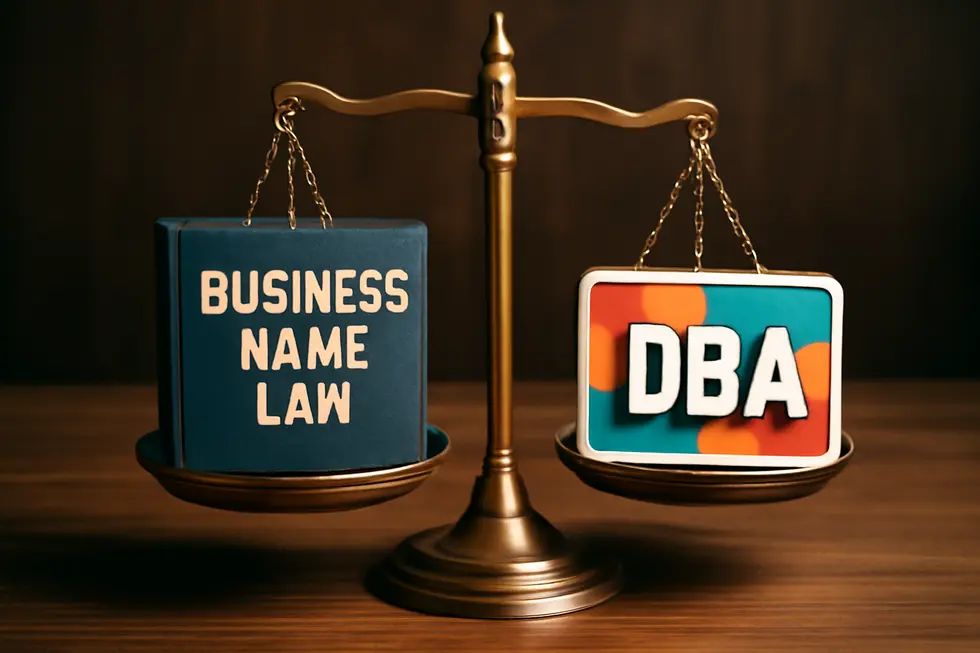Introduction
Choosing the right business name is a crucial decision that affects everything from legal compliance to marketing effectiveness. Two terms often confused but fundamentally different are the legal business name and the trade name. The legal business name defines the official identity of your company for registration, contracts, and tax purposes, ensuring your business is uniquely recognized at the state level. In contrast, a trade name or DBA allows you to present a different brand or public identity without changing your legal status. Exploring these concepts in depth reveals how they differ in definition, registration, legal protections, practical use, and strategic value. Each chapter builds a clear understanding of how legal business names and trade names interplay and impact your business operations, tax obligations, brand presence, and long-term management decisions.
Tables of Contents
Chapter 1: Legal Business Name vs Trade Name: Definitions and Core Differences
- Understanding Legal Business Names and Trade Names: Registration Nuances and Legal Safeguards
- Economic and Societal Impact of Legal Business Names and Trade Names
Chapter 2: Legal Business Name vs Trade Name: Registration and Legal Requirements
- Navigating State Registration and Legal Roles of Business Names and DBAs
- Navigating the Economic and Societal Effects of Legal Business and Trade Name Registration
Chapter 3: Legal Business Name vs Trade Name: Legal Protections and Exclusivity
- Understanding State-Level Exclusivity and Legal Safeguards: Legal Business Names Compared to Trade Names
- Harnessing Nationwide Trademark Protection for Brand Flexibility Beyond Legal and Trade Names
Chapter 4: Legal Business Name vs Trade Name: Usage in Business Operations and Branding
- Distinguishing Legal and Trade Names: The Core Legal Identity Versus Dynamic Brand Expression
- Balancing Branding Flexibility and Legal Safeguards: Trade Names, Legal Names, and Trademark Protection
Chapter 5: Legal Business Name vs Trade Name: Impact on Tax Compliance and Documentation
- Understanding How Legal Business and Trade Names Define Entity Status and Tax Responsibilities
- Navigating Tax Accuracy and Legal Liability: The Crucial Role of Legal Business Names Over Trade Names
Chapter 6: Legal Business Name vs Trade Name: Strategic Importance in Business Management
- How Branding and Market Positioning Shape the Use of Legal Business Names and Trade Names
- Navigating Legal and Financial Stakes: The Impact of Business Names on Risk and Branding
Chapter 1: Legal Business Name vs Trade Name: Definitions and Core Differences

1. Understanding Legal Business Names and Trade Names: Registration Nuances and Legal Safeguards
A legal business name represents the official, registered identity of a business entity recognized by state authorities. This name appears on critical legal documents such as articles of incorporation or organization, tax filings, contracts, and banking records. Typically, it must comply with state-specific naming regulations, require unique distinction within the jurisdiction, and include any mandatory entity designators like “LLC” or “Inc.” This registration process not only formalizes the business’s existence but also establishes strong legal recognition and enforceability in dealings with government and third parties.
In contrast, a trade name, often referred to as a “doing business as” (DBA) name, serves as the public-facing alias under which a business markets its goods or services. While a trade name must also be registered with appropriate state or local agencies to operate legally under a different name than the registered legal business name, this registration offers limited protection. Unlike the legal business name, a trade name does not guarantee exclusivity and is generally insufficient to prevent others from using the same or similar names outside the local jurisdiction.
The distinction in legal protections is significant: the legal business name confers a strong state-level identity and liability shield tied to the formal business entity. Conversely, the trade name functions primarily as a marketing tool without extending liability protection or exclusive usage rights. To secure broader and nationwide exclusive rights over a brand name or business identity, businesses often pursue federal trademark registration. A federally registered trademark gives the owner the exclusive right to use the name or logo nationally and legal remedies against infringement. Additionally, common law trademark rights can arise automatically through the name’s commercial use, though geographic scope remains limited to areas where the name is actively recognized.
Thus, understanding these differences guides business owners in managing their compliance and branding strategies effectively. Registering a legal business name provides a foundation for formal operations, while trade name registration enables flexible branding. However, for comprehensive name protection, combining these registrations with trademark safeguards is essential. For more on legal protections tied to business names, explore in-depth guidance on trademark protection for business names and logos.
2. Economic and Societal Impact of Legal Business Names and Trade Names
The economic and societal implications of legal business names and trade names reveal their unique roles in shaping commerce and market behavior. A legal business name is the formal identifier registered with state authorities, providing the backbone for legal recognition, contract enforcement, and tax compliance. This official status carries economic weight, as it ensures a distinct business presence within a jurisdiction, safeguards assets, and enhances credibility with clients, investors, and regulators. The costs and regulatory demands associated with maintaining a legal business name reflect this significance, underscoring its role as a foundation for economic stability. Exclusive rights granted by legal business names prevent competing entities within the state from adopting an identical name, protecting the business’s identity and supporting long-term value.
In contrast, trade names or DBAs serve a more flexible economic function. They facilitate branding versatility without the need to create separate legal entities, allowing a single business to appeal to diverse market segments or test new products efficiently. This adaptability encourages entrepreneurial creativity and competition, enabling businesses to respond swiftly to consumer preferences. However, trade names offer limited legal protection; they are generally registered at a local or state level and do not assure exclusivity nationwide. Consequently, identical or very similar trade names may coexist in different jurisdictions, which can sometimes cause consumer confusion. This reality reflects a decentralized regulatory environment where local registration suffices but lacks the powerful enforcement mechanisms found in trademarks or legal business name protections.
Societally, the distinction between these types of names reflects broader trends emphasizing business agility and market responsiveness alongside legal accountability. The legal business name anchors the formal economy, while trade names embody the dynamism of commerce and marketing strategies. Businesses aiming for broader geographic reach often supplement these tools with trademark registrations to secure national brand exclusivity and stronger consumer recognition. Understanding this interplay is vital for entrepreneurs to balance regulatory compliance, brand development, and consumer trust effectively.
For more insights into protection strategies beyond trading names, consider exploring resources on trademark protection in business naming.
Chapter 2: Legal Business Name vs Trade Name: Registration and Legal Requirements

1. Navigating State Registration and Legal Roles of Business Names and DBAs
When establishing a business, understanding the registration procedures and legal distinctions between a legal business name and a trade name (DBA) is essential for compliance and protection. The legal business name is the official, registered identifier of the business entity within the state. Obtaining this name requires choosing a business structure such as an LLC or corporation and submitting formation documents—like Articles of Incorporation or Organization—with the state’s relevant agency. This process not only registers the name but also creates the legal entity, which is required for executing contracts, filing taxes, and limiting liability. The legal name must be unique within the state jurisdiction and typically includes designators like “LLC” or “Inc.” to reflect the business structure.
In contrast, a trade name or DBA is a name a business uses publicly that differs from its legal name. This name functions primarily for branding and customer recognition rather than legal identity. Trade names are registered at the local or state level through a trade name or DBA filing, which authorizes the business to operate under this alternative name but does not create a separate legal entity. Unlike legal business names, trade names do not guarantee exclusivity nationwide and do not provide strong legal protection against others using the same or similar names. Their registration is generally less expensive and simpler but serves a different operational purpose.
Legally, contracts and official documents must use the legal business name to ensure validity and enforceability. The trade name cannot substitute this function but can be used in marketing and public communication to establish a distinct brand image. Importantly, registering a trade name avoids customer confusion when the operating name differs from the legal entity’s name. However, to secure exclusive rights beyond the limited protections of trade name registration, businesses often pursue trademark registration, which offers nationwide protection and stronger enforcement powers.
Thus, the legal business name anchors the formal existence and legal obligations of a business, while trade names allow operational flexibility and branding diversity. Businesses often maintain one legal business name while registering multiple trade names to manage different brands or lines of business. This dual registration strategy ensures legal compliance and effective market presence. For a deeper understanding of legal protections beyond name registration, explore detailed information on trademark and trade name distinctions.
2. Navigating the Economic and Societal Effects of Legal Business and Trade Name Registration
The registration of a legal business name and a trade name (or DBA) plays a pivotal role not only in establishing a company’s identity but also in shaping its economic and societal footprint. A legal business name, formally registered with the state and often including designators like “LLC” or “Inc.”, serves as the backbone of a company’s legal existence. This official naming ensures exclusivity and clarity in governmental and financial dealings, which can increase trust among investors, lenders, and consumers. By clearly delineating business responsibilities and protections, primarily in limited liability entities, the legal name supports economic stability and risk management for entrepreneurs.
Conversely, trade names provide flexibility and marketing agility. Operating under a DBA allows businesses to reach diverse markets using distinctive brand identities without the expense or complexity of altering their legal entity. This approach fosters innovation and encourages entrepreneurial ventures, especially beneficial to small businesses and sole proprietors aiming to establish a memorable presence. While trade names lack the same rigorous legal safeguards or nationwide exclusivity as legal business names, their registration enhances transparency at the local level, contributing to consumer confidence and competitive marketplace dynamics.
Beyond economic implications, the societal impact of these registrations includes improved accountability and public trust. Legal business names, being part of public records, enable individuals and organizations to verify legitimacy and seek recourse when necessary. Trade names complement this by supporting local commerce and community engagement, nurturing a vibrant entrepreneurial landscape.
Compliance with registration requirements is essential to maintain these benefits. Legal business names must be unique and adhere to regulatory conventions, protecting consumers and avoiding confusion. Trade names, though easier to register, do not guarantee exclusive use and can overlap geographically or across industries. For businesses seeking stronger protections or national exclusivity, moving beyond registration to trademarking their brand names is advisable. This strategy safeguards intellectual property rights and reinforces brand value on a broader scale.
Understanding the nuanced economic and societal impacts of legal business names and trade names equips entrepreneurs and established companies alike with the insight needed to align identity, growth, and legal compliance effectively. For more on protecting business names, exploring options like trademark registration can further clarify this landscape.
Chapter 3: Legal Business Name vs Trade Name: Legal Protections and Exclusivity

1. Understanding State-Level Exclusivity and Legal Safeguards: Legal Business Names Compared to Trade Names
A business’s legal business name stands as its official, registered designation within a specific state, serving as its unique legal identity. When a business registers as an LLC, corporation, or similar entity, the legal business name must be distinct and cannot exactly duplicate an existing name within that state. This exclusivity shields the business from state-level confusion and ensures clarity in legal and tax documents. The inclusion of entity designators—such as “LLC” or “Inc.”—further distinguishes these names and emphasizes their formal status. This state-level exclusivity is strictly enforced by state business registration authorities, providing businesses with a protected identity essential for compliance and official recognition.
In contrast, a trade name, often registered as a DBA (“doing business as”), offers more flexibility but lacks the exclusivity inherent to legal business names. A trade name is an alias under which a business may operate publicly, typically for marketing or branding purposes. However, registering a trade name does not prohibit other businesses within the same or different jurisdictions from using identical or similar names. Consequently, trade names do not carry strong legal protections against duplication or misuse by others. They do not form separate legal entities and offer no liability protections or exclusive rights. This makes DBAs a practical, low-cost option for businesses wanting to diversify branding without creating new entities but with limited safeguards.
For businesses seeking broader protection beyond state-level exclusivity, the registration of trademarks is crucial. Trademarks grant national-level exclusive rights within a particular industry and allow legal recourse against infringement. Unlike legal business names confined to state jurisdiction, trademarks guard brands across the entire country. Together, these layers—legal business name for state identity, DBAs for flexible branding, and trademarks for extensive protection—equip businesses with a strategic balance between legal security and marketing adaptability.
This nuanced understanding of exclusivity and legal safeguards clarifies why businesses often combine these naming tools. For more on how these protections compare and interact, explore trademark protection for business names and logos.
2. Harnessing Nationwide Trademark Protection for Brand Flexibility Beyond Legal and Trade Names
While legal business names and trade names establish your business’s identity at the state or local level, their protections remain geographically limited and often lack exclusivity beyond those boundaries. A federally registered trademark transcends these constraints by granting nationwide exclusive rights to use your brand name in connection with your goods or services. This powerful protection not only prevents competitors across the country from using confusingly similar names, but also strengthens your position in legal disputes, offering remedies that state registrations cannot provide.
Unlike a legal business name—which must include entity designators and is unique only within one state—or a trade name (DBA) that may be shared by others and is registered locally, a trademark creates a robust legal shield that supports consistent branding across multiple markets. It allows companies to license, franchise, or expand under a single, protected identity nationwide without fear of costly rebranding or infringement claims. Moreover, trademark registration enhances brand value, appealing to investors by signaling a well-guarded asset.
Federal trademark rights often hinge on who files first, not just who uses the name initially. Prompt registration is therefore essential to secure these benefits and avoid potential conflicts with later businesses attempting to claim your brand. Once registered, maintaining your trademark requires ongoing renewal and evidence of continued use, ensuring your exclusive rights endure over time.
For entrepreneurs leveraging multiple trade names under one legal business name, trademarks provide an invaluable layer of protection that safeguards all your chosen brands beyond local jurisdictions. This strategic approach empowers businesses to grow confidently nationwide and build lasting recognition. For more in-depth guidance on securing trademark protection and navigating complexities, exploring trademark protection for business names and logos can be especially helpful.
Chapter 4: Legal Business Name vs Trade Name: Usage in Business Operations and Branding

1. Distinguishing Legal and Trade Names: The Core Legal Identity Versus Dynamic Brand Expression
The legal business name serves as the cornerstone for a company’s formal identity, representing the name under which it is officially registered with state or federal authorities. This name must be unique within its jurisdiction, and typically includes legal designators such as “LLC,” “Inc.”, or “Ltd.,” signaling the business structure and providing clarity in legal and financial contexts. The legal name is vital for compliance—it must appear on contracts, tax filings, banking documents, and all governmental records. Because this name uniquely identifies the business entity, it enjoys strong legal protection at the state level, preventing confusion or duplication within that jurisdiction.
In contrast, a trade name, often called a DBA (doing business as), offers operational flexibility by allowing a business to present a different public-facing name without creating a new legal entity. Businesses commonly use trade names to build distinct brands, appeal to different market segments, or manage multiple product lines under one legal umbrella. Unlike legal business names, trade names usually omit formal suffixes and are registered locally, such as with county or state agencies. However, registering a trade name provides limited legal protection—exclusivity is generally restricted to the registration jurisdiction, and trade names do not guard against infringement outside that area.
While a legal business name establishes official recognition and exclusivity essential for formal interactions, trade names primarily serve marketing and brand-building purposes. Their memorable and often simpler nature facilitates customer engagement and diverse branding strategies. Still, businesses seeking broader protection for a trade name must pursue trademark registration, which grants stronger, nationwide exclusive rights.
Thus, the legal business name lays the groundwork for a company’s lawful existence and accountability, while trade names enrich brand expression and operational versatility. Understanding this distinction is crucial for entrepreneurs in balancing regulatory compliance with effective branding. For deeper insights into protecting business names, the resource on trademark protection offers valuable guidance.
2. Balancing Branding Flexibility and Legal Safeguards: Trade Names, Legal Names, and Trademark Protection
The distinction between a legal business name and a trade name significantly impacts how a business navigates branding, marketing, and intellectual property rights. The legal business name is the registered, official name under which the business exists in the eyes of the state. It appears on all legal contracts, tax documents, and governmental filings, incorporating entity designators like “LLC” or “Inc.” This registration grants the business exclusive use of that name within the state’s jurisdiction, preventing other entities from registering the identical name, which ensures clear legal identity and reduces confusion in official matters.
In contrast, a trade name, commonly known as a DBA (doing business as), provides businesses the ability to operate and market themselves under a different name than the legal one. This flexibility is essential for businesses targeting diverse audiences or managing multiple brands under one legal entity. For example, one corporation could register several DBAs to cater to distinct product lines or market segments without the expense and complexity of forming separate entities. However, unlike legal business names, trade names do not offer exclusive ownership. Multiple businesses in different areas can register the same DBA, limiting its protective scope mostly to local recognition rather than legal exclusivity.
When it comes to protecting brand identity beyond registration, trademarks play a critical role. Unlike legal business names and DBAs, trademarks provide nationwide exclusive rights to brand names and logos in designated industries. Securing a trademark requires a federal registration process, but it grants strong legal recourse against unauthorized uses that could cause consumer confusion. Businesses often combine these tools strategically: using a legal business name to establish their formal entity, DBAs to diversify their market presence, and trademarks to strongly defend their brand assets and logos on a national scale.
Navigating this hierarchy—legal business name for official identity, trade names for marketing agility, and trademarks for intellectual property protection—allows entrepreneurs to balance operational needs with strategic brand defense. For a deeper understanding of trademark protection and how it complements business names, explore resources on trademark protection for business names and logos.
Chapter 5: Legal Business Name vs Trade Name: Impact on Tax Compliance and Documentation

1. Understanding How Legal Business and Trade Names Define Entity Status and Tax Responsibilities
A legal business name represents the official registered identity of a business, formalized with state authorities when creating an entity such as an LLC or corporation. This name usually includes designators like “LLC” or “Inc.”, which reflect the company’s legal structure and provide limited liability protection to its owners. Its uniqueness is enforced at the state level, ensuring no other business within the jurisdiction shares the same registered name. This legal name appears on all official documents, from contracts and bank accounts to tax filings and employer identification numbers (EINs). Using the legal business name in tax and governmental correspondence is mandatory, as it reflects the specific legal entity that bears the tax obligations and liabilities.
In contrast, a trade name, commonly known as a DBA (doing business as), serves purely as a public-facing alias under which a business operates for marketing and customer interaction. It does not establish a separate legal entity nor provide liability protection. Instead, it allows a business, even a sole proprietor or a corporation, to present a more approachable or brand-specific name without altering the company’s official identity. For instance, an LLC named “AAA Building LLC” could register the trade name “The Construction Brothers” to operate under a more customer-friendly brand. While trade names are also registered, the registration is usually local or state-level and does not guarantee exclusivity. Multiple businesses across different regions can use identical trade names without infringing on legal rights.
From a tax compliance perspective, the distinction is critical. Tax filings, including income and payroll taxes, must reflect the legal business name linked to the entity’s EIN. The tax treatment depends on the legal structure; for example, LLCs may be taxed as pass-through entities or corporations, whereas sole proprietors using a DBA report income directly on their personal returns. The trade name does not change tax status, obligations, or liability. It is a tool for branding and public recognition, while the legal business name anchors the business’s legal existence and regulatory compliance.
For more detailed insights about protecting your business identity, explore our guide on company name copyright registration.
2. Navigating Tax Accuracy and Legal Liability: The Crucial Role of Legal Business Names Over Trade Names
The distinction between a legal business name and a trade name carries significant implications for tax documentation accuracy and legal risk management. The legal business name, being the officially registered name with the state, is the sole reliable identifier for government agencies during tax filings, contract formation, and judicial proceedings. Tax authorities demand that all filings bear the legal business name because it uniquely links the business entity to its tax obligations and benefits, such as tax credits or liabilities. Using only a trade name on tax documents risks misidentification, delays, or even rejection by taxing authorities since a trade name does not satisfy formal entity recognition requirements.
Trade names, often referred to as DBAs (Doing Business As), primarily serve marketing or branding purposes. They allow a business to operate publicly under a name different from its legal registration without forming a new legal entity. While trade names provide valuable flexibility for branding diverse business lines, they carry limited legal protections. Unlike the exclusive registration and liability shield offered through the legal business name—particularly for corporations and LLCs—trade names generally do not confer ownership exclusivity and do not shield owners from personal liability. Moreover, identical trade names can coexist in different jurisdictions, increasing the risk of brand confusion and legal disputes.
From a risk management perspective, proper use of the legal business name on invoices, contracts, and tax documents enforces liability limitations and clarifies the responsible legal entity. Businesses that rely on trade names for official purposes inadvertently expose themselves to compliance risks and potential audits. Ensuring tax documents accurately reflect the legal business name minimizes the chance of penalties or rejected submissions due to mismatched or ambiguous identification.
In practice, businesses often operate under a structure where a single legal business name underpins multiple trade names. This dual approach balances legal protection with marketing versatility. However, entrepreneurs must register trade names appropriately at the local level and maintain strict adherence to using the legal business name in all tax and legal documentation to secure compliance and reduce exposure to risk.
For further insights on protecting your business name and brand, review detailed guidance on trademark protection for business names and logos.
Chapter 6: Legal Business Name vs Trade Name: Strategic Importance in Business Management

1. How Branding and Market Positioning Shape the Use of Legal Business Names and Trade Names
The choice between a legal business name and a trade name plays a pivotal role in shaping a company’s branding and market positioning strategy. A legal business name is the formal, registered name used for official purposes such as contracts and tax filings; it conveys the entity’s legal identity but is often less visible to customers. Conversely, a trade name—or DBA—serves as the public-facing brand, designed to appeal directly to target markets. This distinction allows businesses the flexibility to craft a unique brand persona under a trade name while maintaining one consistent legal identity.
Branding relies heavily on creating emotional connections with customers, and the trade name is often the primary vehicle for this. Businesses can adopt trade names that are memorable, relatable, and aligned with their target audience’s expectations, helping to build loyalty and differentiate from competitors. For example, a legal business named “Sunrise Technologies LLC” may market its products under a trade name that better captures its brand essence and resonates with consumers. Meanwhile, the legal business name signals legitimacy and stability in formal and regulatory contexts.
Market positioning benefits significantly from this arrangement because a trade name allows a company to occupy specific niches or experiment with diverse product lines without altering the underlying legal entity. This flexibility supports nuanced branding efforts that cater to varying demographics or industry segments. However, it is essential to recognize that trade names typically lack exclusivity beyond local registration, and unlike trademarks, they do not provide nationwide legal protection. Businesses focused on establishing strong, protected brand identities should consider trademark registration in addition to selecting their trade names.
Integrating the strategic use of legal business names and trade names allows businesses to optimize their public image while ensuring compliance and legal clarity. Effective branding through trade names strengthens market positioning and fosters customer loyalty, whereas the legal business name underpins operational integrity. Understanding this dynamic is crucial for entrepreneurs aiming to balance regulatory demands with powerful, adaptable branding strategies, as explained further in resources on trademark protection for business names and logos.
2. Navigating Legal and Financial Stakes: The Impact of Business Names on Risk and Branding
In any business framework, the choice and registration of a legal business name versus a trade name carry significant legal and financial ramifications that deeply influence risk management, credibility, and marketing strategies. The legal business name is the formal, state-registered identifier of the business entity and represents the foundation for legal recognition, contractual agreements, and tax obligations. This name must be unique within the state, often accompanied by entity designators like “LLC” or “Inc.,” which signal the business’s structural and liability protections. Crucially, this registration shields owners’ personal assets from business liabilities, providing limited liability protection essential for managing financial risks.
Conversely, a trade name, or DBA, functions as a public-facing alias through which a business markets its goods or services without forming a new legal entity. While it grants flexibility to diversify branding or capture varied market segments, the trade name lacks exclusivity and does not provide liability protection. Its registration is generally simpler and more affordable, often managed at a local or county level, but it leaves businesses vulnerable to name duplication or infringement unless additional trademark protections are pursued.
Strategically, effective business management involves harnessing the strengths of both naming conventions. The legal business name anchors the enterprise’s legal standing and financial credibility, while trade names enable agile branding and customer engagement across different business lines. Many enterprises adopt a model where one legal name encompasses multiple DBAs to expand visibility without incurring the cost and complexity of multiple entities.
Failing to properly register or distinguish these names can lead to serious consequences such as losing liability protection, blending personal and business finances, or encountering tax complications. For amplified safeguards, businesses often complement these with trademark registrations, ensuring nationwide exclusivity and protecting valuable brands. Understanding these distinctions allows entrepreneurs to balance legal compliance, risk mitigation, and marketing needs effectively, forming a robust platform for long-term success.
For deeper insights on protecting your business name and brand identity, consider exploring comprehensive advice on trademark protection for business names and logos.
Final thoughts
Distinguishing between a legal business name and a trade name is fundamental for any business owner aiming to balance legal compliance, brand identity, and operational efficiency. The legal business name anchors your company’s official and unique identity, carrying significant legal protections and serving as the foundation for contracts, tax filings, and government recognition. On the other hand, trade names or DBAs provide valuable flexibility by allowing varied public-facing identities to cater to different markets or product lines, albeit with limited legal exclusivity. Understanding registration nuances, legal safeguards, business usage, and tax implications helps entrepreneurs craft informed decisions that safeguard their venture’s integrity while optimizing marketing reach. Strategically leveraging both names supports robust business management and growth. Armed with this knowledge, business owners can better navigate registration complexities, protect their brand assets, and comply with regulations to thrive in competitive marketplaces.
Your IP is the foundation of your success – let’s protect it together before it’s too late. We can’t wait to help you turn your ideas into legally secured assets.
About us
undefined


